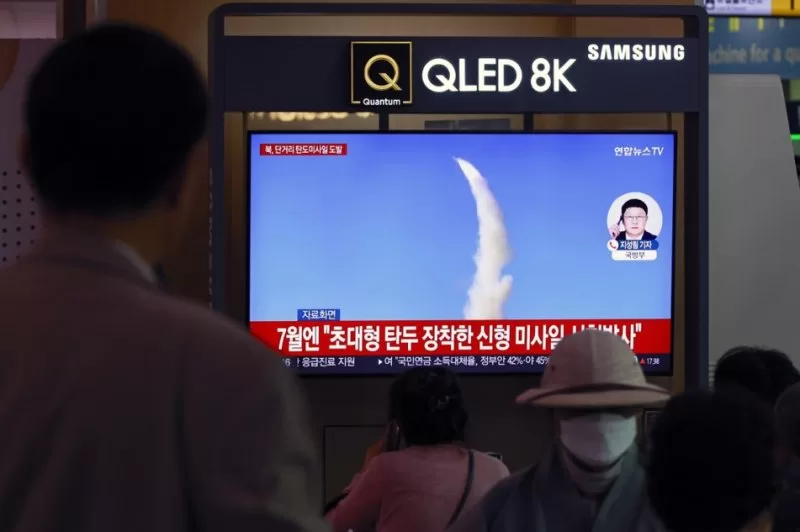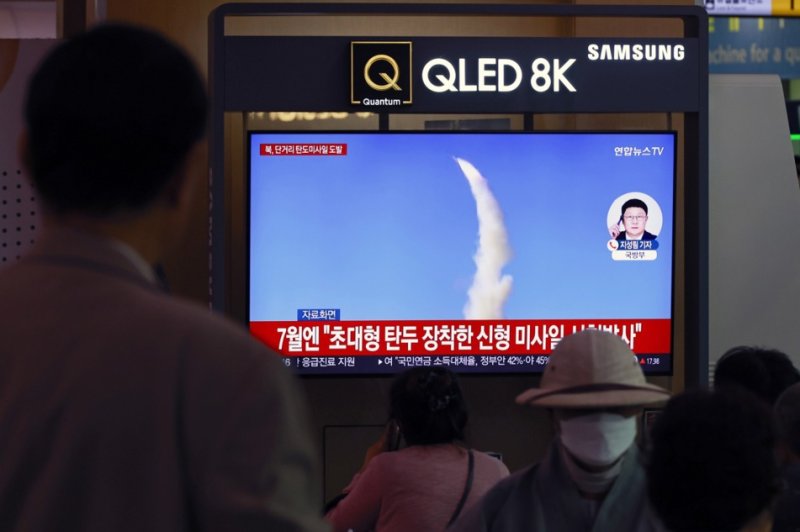People watch the news of a North Korean missile launch at a train station in Seoul, South Korea on Thursday. North Korea launched several short-range ballistic missiles into the East Sea, South Korea’s Joint Chiefs of Staff said. Photo by Jeon Heon-kyun/EPA-EFE
SEOUL, Sept. 12 (UPI) — North Korea launched multiple ballistic missiles into the East Sea on Thursday, South Korea’s military said, days after leader Kim Jong Un called for a nuclear weapons buildup.
“Our military detected several short-range ballistic missiles launched from the Pyongyang area into the East Sea around 07:10 [Thursday],” Seoul’s Joint Chiefs of Staff said in a text message to reporters.
The missiles flew roughly 225 miles before splashing down in the body of water also known as the Sea of Japan. The JCS said it was analyzing the launch and closely sharing information with the United States and Japan.
Hawaii-based U.S. Indo-Pacific Command said that it detected the launch and was consulting with regional allies and partners.
“The United States condemns these actions and calls on the DPRK to refrain from further unlawful and destabilizing acts,” the command said in a statement. “While we have assessed that this event does not pose an immediate threat to U.S. personnel, or territory, or to our allies, we continue to monitor the situation.”
The Democratic People’s Republic of Korea is the official name of North Korea.
The launch was the first since July 1, when North Korea fired what it claimed were missiles carrying a new “super-large warhead.”
North Korea this week celebrated its 76th anniversary of its founding, and leader Kim Jong Un called for a nuclear weapons buildup in response to threats posed by the United States and South Korea.
U.S. and South Korean forces wrapped up a 13-day amphibious landing exercise near the southeastern city of Pohang on Saturday. The allies also recently concluded their annual summertime Ulchi Freedom Shield joint exercise, which the North condemned as the “most offensive and provocative war drills for aggression.”
Tensions have grown on the Korean Peninsula over the past few years, with Pyongyang steadily unveiling military hardware and testing new weapons, some of which could be intended for shipment to Russia.
North Korean state media on Monday showed Kim inspecting a new 12-axle transporter erector launcher, or TEL. The launcher appears to be an upgrade to the 11-axle version used to mount their Hwasong-17 intercontinental ballistic missile, generating speculation that a new ICBM may be revealed soon.
Last month, North Korea also showed off new “suicide” attack drones and an upgraded multiple rocket launcher.
Pyongyang and Moscow have strengthened their relationship in the wake of the Kremlin’s invasion of Ukraine, with Kim and Russian President Vladimir Putin signing a mutual defense treaty in June.
Washington and its allies accuse North Korea of supplying munitions to Russia, which Pyongyang has denied. A recent South Korean intelligence report said the North has sent 13,000 shipping containers suspected of carrying arms to Russia since mid-2022.
On Tuesday, South Korea and the member states of the U.S.-led United Nations Command called on Russia and North Korea to “immediately cease” their collaboration.
“The defense ministers and representatives expressed serious concern over military cooperation between Russia and the DPRK … including weapons transactions and technological cooperation which constitute a violation of relevant United Nations Security Council resolutions,” South Korea and the UNC said in a joint statement. “They urged Russia and the DPRK to immediately cease all such activities and abide by these resolutions.”
The UNC plays a key role in maintaining and enforcing the armistice agreement that halted fighting in the 1950-53 Korean War, with duties that include controlling DMZ access and communicating with the North Korean military.
Last month, Germany became the 18th member state to formally join the UNC.

